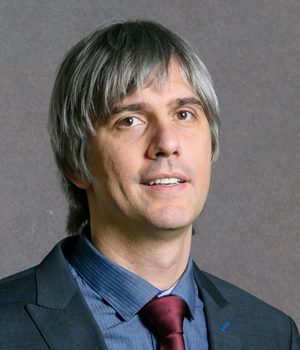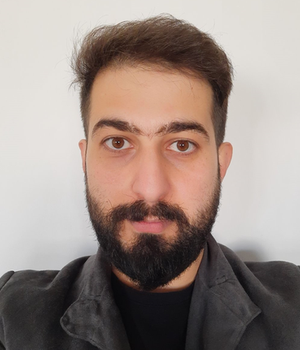Know more about the keynote speaker

George Papastefanatos (Principal Researcher; ATHENA Research and Innovation Centre)
George is a Principal Researcher at the ATHENA Research and Innovation Centre. His research interests are in the area of cloud computing, big data management and analytics, working in problems related to scalable visual analytics, data pipelines, knowledge graphs and data evolution. He obtained his Diploma and PhD in Computer Science from the National Technical University of Athens (NTUA). He has been adjunct researcher in NTUA, University of Athens, National Centre for Social Research and University of Ioannina and worked as an external IT expert in various private and public organizations in the design and implementation of large-scale IT projects. He has participated and coordinated more than 20 EU and National funded projects, related to Big Data, AI, Cloud computing and research Infrastructures. He has coedited 1 book, 3 chapters in books and more than 80 publications in international conferences and journals in the areas of big data management and analytics. Three of his articles have been selected as Best Papers. He is the Project Coordinator of ExtremeXP project.
To know more about the talks, check our program
SADIS
Data-Intensive Systems and their Impact
The phrase data is the new oil coined by Clive Humby in 2006, highlights that data, like oil, gains true value only when properly processed. By 2025, data-driven methods, including machine learning (ML), have become the primary force of innovation, transforming industries such as predictive maintenance, cybersecurity, mobility, public health, and emergency coordination.
Defining Data-Intensive Systems
These systems go beyond ML-based solutions, encompassing workflow automation engines, simulation-heavy and visualization-heavy applications, and data analytics. They range from simple automated data pipelines to complex MLOps frameworks that incorporate real-time monitoring and continuous model retraining. Many of these systems extend beyond centralized architectures to decentralized, heterogeneous approaches, particularly for Cyber-Physical Systems and IoT.
Challenges in Design and Architecture
The development of data-intensive systems, much like ML-based solutions, still relies heavily on the intuition and expertise of experienced engineers. As demand continues to grow, there is an urgent need for scalable design and architectural methodologies that software engineering and architecture communities must address.
A Platform for Advancement
SADIS provides a forum for researchers, practitioners, and industry experts to exchange ideas and explore advancements in software architecture for data-intensive systems. The workshop will focus on scalable, secure, and efficient solutions, discussing innovative methods, frameworks, and tools to enhance data-intensive workflows, integration, and real-world adaptability.
SADIS
- ML training pipelines
- Extreme flexibility
- User in the loop aspects
- Online optimization
- Architectural approaches for MLOps
- Decentralized architectures for data-intensive systems
- Data-intensive CPS/IoT and edge-cloud systems
- Patterns
- Model-driven approaches for data-intensive systems and data workflows
- Domain-specific languages for data-intensive systems and data workflows
- Reference architectures for data-intensive systems and data workflows
- Security and privacy concerns for data pipelines
- Distributed ledgers and NFTs
- Integration with data sources
- Digital Twins
- Micro-frontends and architectures for data visualization and presentation
- Approaches for integration of data pipelines
- Adaptive visualization approaches
- Explainable AI
- Building knowledge across experiments
- Continuous data-driven optimization via experiments
- Architecture approaches, challenges, implications of AutoML
SADIS
The workshop invites four types of submissions:
-
Research Contributions (long papers, up to
1216 pages LNCS): Full research papers presenting novel contributions and theoretical advancements in software architectures for data-intensive systems. These submissions should provide an in-depth analysis, rigorous evaluation, and significant contributions to the field - Case Studies/Experience Reports from Industry (short papers, up to 8 pages LNCS): Contributions that share practical insights, challenges, and lessons learned from real-world implementations of software architectures. While these papers may not focus on novelty, they offer valuable perspectives on addressing industrial challenges.
- Artifacts/Benchmarks/Tools/Platforms (short papers, up to 8 pages LNCS): Papers showcasing innovative tools, platforms, or benchmarks that support the design, development, or evaluation of data-intensive systems. These contributions should provide practical solutions or demonstrate the potential for real-world application.
- Dissemination Papers: Already published papers from top software/data engineering venues that are relevant to the workshop. Please upload the original submission and abstract to our submission site. Please indicate where the paper has been accepted as a first sentence in the abstract. Dissemination papers will go through a short review from the organizers, checking for their quality and relevance to the workshop. Dissemination papers will not be included in the workshop proceedings.
Submissions must be written in English and follow the LNCS format guidelines. All submissions will be reviewed by at least three members of the Program Committee (or their sub-reviewers) and will be evaluated based on relevance, quality, and originality.
At least one author of each accepted paper is required to register, attend, and present the work at the workshop. The workshop especially encourages PhD students and early-career researchers to contribute visionary ideas and preliminary work, fostering innovation and creativity in the field.
Accepted papers will be included in the workshop proceedings, which we expect to be published along with other workshop papers at ECSA in the ECSA companion proceedings.
Publication and proceedings
ECSA 2025 will use a single review process for workshop proceedings. For accepted papers, the minimum number of pages for each workshop paper is 8 and the maximum is 16 pages in the LNCS format. The proceedings of the workshops will be printed by Springer in the LNCS series.
SADIS

Ilias Gerostathopoulos
Workshop Co-chair
Vrije Universiteit Amsterdam, Amsterdam, The Netherlands
Ilias Gerostathopoulos is an Assistant Professor of computer science with Vrije Universiteit Amsterdam, The Netherlands. His research interests include software engineering, software architecture, and self-adaptive systems. He received the Ph.D. degree in computer science in 2015 from the Department of Distributed and Dependable Systems, Faculty of Mathematics and Physics, Charles University, Prague. He was also as a Postdoctoral Researcher with the Department of Informatics, Technical University of Munich. He serves in program committees of several international conferences in the fields of software architecture and self-adaptive systems. Ilias has also co-chaired several tracks of such conferences (including the technical tracks of ECSA 2022 and ACSOS 2022) and co-organized five international workshops 9 (at ECSA, ICSE, SASO, and ACSOS).

Marcela Tuler de Oliveira
Workshop Co-chair
Delft University of Technology, Delft, The Netherlands
Marcela Tuler de Oliveira is an Assistant Professor in Trustworthy Data Systems at TU Delft's Department of Engineering Systems & Services as part of the ICT section. She is a Telecommunications Engineer and a thought leader in digital solutions for cross-organizational data sharing. She has participated in the program committees of international conferences IEEE CloudNet 2024 and IEEE BCCA 2025.
SADIS
|
Keerthiga Rajenthiram, Pauline Delporte and Patricia Lago
AutoML: A Tertiary Study of Phases, Methods, Tools, and Frameworks
|
Full Paper |
|
Moamin Abughazala and Henry Muccini
DQGen: Scalable Metadata-Driven Automation for Data Quality Validation in Data-Intensive Applications
|
Full Paper |
|
Moamin Abughazala and Henry Muccini
A Visionary Architecture for Adaptive Data Contracts in Behavior-Driven IoT Systems
|
Short Paper |
|
Francisco Mendonça, Nabil Abdennadher and Giovanna Di Marzo
FAIR-ER Data: Proposing a data model for Data Cooperatives
|
Short Paper |
|
Nikolas Theologitis, Panagiotis Gidarakos, Stavros Maroulis, Loukas Kavouras, Giorgos Giannopoulos and George Papastefanatos
GLOVES 2.0: Global Counterfactual-based Visual Explanations
|
Short Paper |
|
Milad Abdullah, Petr Hnetynka and Jiyan Salim Mahmud
Temporal Harmonization of Heterogeneous Software Logs: A Unified Model for Time-Series Analysis
|
Short Paper |
|
Daniel Angelo Esteves Lawand, Lucas Quaresma Medina Lam, Roberto Oliveira Bolgheroni, Renato Cordeiro Ferreira and Alfredo Goldman
Is Your Training Pipeline Production-Ready? A Case Study in the Healthcare Domain
|
Short Paper |
SADIS

Tuesday 16th September, 2025, at Room 1
From Data to Insights: Efficient Human-in-the-Loop methods for Mastering Complex Data Intensive pipelines
09:00 - 10:30
This keynote explores how efficient and effective data visualization and visual analytics can bridge the gap between complex AI pipelines and human understanding. As AI systems become more sophisticated, their processes and decisions can seem opaque. The talk will first present how visualization transforms the performance of abstract algorithms, pipeline steps and vast datasets into clear, accessible visual insights. It will then present the fundamentals of visual encoding and present methods for efficient, human-in-the-loop interaction with data-intensive systems. This talk will highlight how effective visualization can reveal patterns and anomalies, foster collaboration, build trust, and ultimately enable more informed decision-making in an AI-driven world.

George Papastefanatos (Principal Researcher; ATHENA Research and Innovation Centre)
George is a Principal Researcher at the ATHENA Research and Innovation Centre. His research interests are in the area of cloud computing, big data management and analytics, working in problems related to scalable visual analytics, data pipelines, knowledge graphs and data evolution. He obtained his Diploma and PhD in Computer Science from the National Technical University of Athens (NTUA). He has been adjunct researcher in NTUA, University of Athens, National Centre for Social Research and University of Ioannina and worked as an external IT expert in various private and public organizations in the design and implementation of large-scale IT projects. He has participated and coordinated more than 20 EU and National funded projects, related to Big Data, AI, Cloud computing and research Infrastructures. He has coedited 1 book, 3 chapters in books and more than 80 publications in international conferences and journals in the areas of big data management and analytics. Three of his articles have been selected as Best Papers. He is the Project Coordinator of ExtremeXP project.
10:30 - 11:00
AutoML: A Tertiary Study of Phases, Methods, Tools, and Frameworks
Keerthiga Rajenthiram, Pauline Delporte and Patricia Lago11:00 - 11:20
SADIS - Full Paper
A Visionary Architecture for Adaptive Data Contracts in Behavior-Driven IoT Systems
Moamin Abughazala and Henry Muccini11:20 - 11:35
SADIS - Short Paper
The Lifecycle Workbench - A Configurable Framework for Digitized Product Maintenance Services
Dominique Briechle, Mohammed Fahad Ali, Marit Briechle-Mathiszig, Tobias Geger, Robert Werner and Andreas Rausch11:35 - 11:50
CASA - Short Paper
Temporal Harmonization of Heterogeneous Software Logs: A Unified Model for Time-Series Analysis
Milad Abdullah, Petr Hnetynka and Jiyan Salim Mahmud11:50 - 12:05
SADIS - Short Paper
Requirements for a Digital Twin of Organizations for Advancing Cybersecurity Risk Management
Bennet Puthuparambil and Claudio Giovanoli12:05 - 12:20
ArchDTO - Short Paper
12:30 - 14:00
Exploring Static Analysis for Understanding Self-Adaptive Systems
Claudia Raibulet and Michele Pugno14:00 - 14:20
CASA - Full Paper
DQGen: Scalable Metadata-Driven Automation for Data Quality Validation in Data-Intensive Applications
Moamin Abughazala and Henry Muccini14:20 - 14:40
SADIS - Full Paper
GLOVES 2.0: Global Counterfactual-based Visual Explanations
Nikolas Theologitis, Panagiotis Gidarakos, Stavros Maroulis, Loukas Kavouras, Giorgos Giannopoulos and George Papastefanatos14:40 - 14:55
SADIS - Short Paper
Is Your Training Pipeline Production-Ready? A Case Study in the Healthcare Domain
Daniel Angelo Esteves Lawand, Lucas Quaresma Medina Lam, Roberto Oliveira Bolgheroni, Renato Cordeiro Ferreira and Alfredo Goldman14:55 - 15:10
SADIS - Short Paper
FAIR-ER Data: Proposing a data model for Data Cooperatives
Francisco Mendonça, Nabil Abdennadher and Giovanna Di Marzo15:10 - 15:25
SADIS - Short Paper
15:30 - 16:00
Discussion and Wrap up
16:00 - 17:30
SADIS
-
Milad Abdullah
Charles University, Czech Republic -
Faezeh Amou Najafabadi
Vrije Universiteit Amsterdam, The Netherlands -
Steffen Becker
Institute of Software Engineering, University of Stuttgart, Germany -
Justus Bogner
Vrije Universiteit Amsterdam, The Netherlands -
Martina De Sanctis
Gran Sasso Science Institute, Italy -
Ivan Compagnucci
Gran Sasso Science Institute, Italy -
Giorgos Giannopoulos
Athena Research Center, Greece -
Petr Hnetynka
Charles University, Czech Republic -
Henry Muccini
University of L'Aquila, Italy -
George Papastefanatos
Athena Research Center, Greece -
Keerthiga Rajenthiram
Vrije Universiteit Amsterdam, The Netherlands -
Karthik Vaidhyanathan
IIIT Hyderabad, India -
Yiannis Verginadis
Information Management Unit, Greece -
Eleni Zarogianni
Intracom Telecom, Greece


